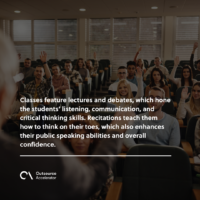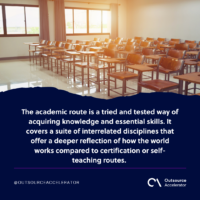No degree, no problem?
Increasing numbers of Millennial and Gen Z professionals feel their degrees are worthless, a claim echoed by Great Place to Work CEO Michael Bush, who pointed out that companies are now focusing on a candidate’s “skills and skills development.”
It’s a belief that seems to have been heavily influenced by the media portrayals of the greatest college dropouts like Bill Gates, Steve Jobs, and Mark Zuckerberg. People disregard that they are just three of the millions of college dropouts in history. Skill, relentlessness, and a bit of luck turned their ideas into a thriving industry. Outside of these tech scions are millions of dropouts who either failed in their enterprises or never achieved the same level of success.
This is not to say that it’s futile to aspire to be the next tech maverick. But the reality is, everyone has a different career narrative. Being a successful dropout doesn’t make one greater than a successful degree holder.
Academic rigor
Claiming college degrees are worthless is a bold assertion that overlooks what the university experience entails. Classes feature lectures and debates, which hone the students’ listening, communication, and critical thinking skills. Recitations teach them how to think on their toes, which also enhances their public speaking abilities and overall confidence.
Reports, term papers, and theses require students to analyze and parse mountains of information. It not only develops their technical abilities, but also teaches them to be resourceful and how to manage their time effectively.
A college degree provides employers with a frame of reference for applicants, especially those with little to no experience. To an extent, it shows an ability to accomplish a series of tasks to complete a larger goal. At this point in time, most employers would prefer someone with a university degree since it’s a good indicator of intelligence and perseverance, two critical skills needed in the workplace.
The academic route is a tried and tested way of acquiring knowledge and essential skills. It covers a suite of interrelated disciplines that offer a deeper reflection of how the world works compared to certification or self-teaching routes.
Networking
Attending university also offers students networking opportunities with fellow students who may share similar interests. Clubs and student organizations expand a student’s network beyond the classroom. Sometimes, all it takes is one person to turn one’s ideas into a legitimate venture.
Some professors can turn into lifelong mentors who can guide the students even after they’ve graduated. Universities also invite industry professionals from time to time to share their experiences with students. First-hand knowledge is invaluable. These professionals can also jumpstart a student’s career through internships that can lead to job offers.
This great blend of academic rigor and social communion makes universities the best training ground for future members of the labor force.
The question for your business
Is your business hiring for (a) qualifications, (b) attitude, or (c) talent?




 Independent
Independent





















